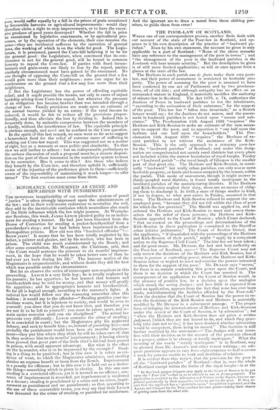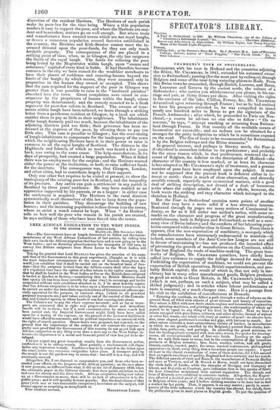THE POOR-LAW OF SCOTLAND.
WHILE one of our correspondents praises, another finds fault with our account of the state of the Poor-law in Scotland, and op- poses to it his own description of the practice of " landward pa-
rishes." Even by his own statement, the account he gives is only applicable to a part of Scotland : " None of the above remarks have any reference to the management of the poor in towns" ; and
"the management of the poor in the landward parishes in Me Lowlands will bear minute scrutiny." But the description he gives is of still more limited application ; as will at once appear from a glance at the state of the law.
The Heritors in each parish can de facto make their own poor- law, and their power of assessment is restricted to heritable pro- perty. The power of assessing for the poor is assumed to have been conferred by one act of Parliament and by two proclama- tions, all of old date ; and although antiquity has no effect on an
unrepealed statute in England, it materially modifies the authority of statute-law in Scotland. The Act 1579, c. 74, authorizes the Justices of Peace in landward parishes to tax the inhabitants, "according to the estimation of their substance," for the suppert of the poor. This law has " fallen into desuetude," as a Scotch lawyer would say ; for the Justices do not assess, and the assess- ment in landward parishes is not levied upon " means and sub- stance." The Proclamation 11th August 1692 "requires" the Heritors and Kirk-Session to make an estimate of the sum neces- sary to support the poor, and to apportion it "one half upon the heritors and one half upon the householders." The Pro- clamation 11th August 1693 " requires " the Heritors of va- cant parishes to act without the assistance of the Kirk- Session. This is the only approach to a statutary poor-law for the "landward parishes" of Scotland; and under this desig- nation are comprehended not merely rural districts but every place not included within the narrow boundaries of royal burghs. Paisley is a "landward parish "—the royal burgh of Glasgow is the smaller part of that great city. The Heritors and Kirk-Session, in nomi- nally " landward" but really urban parishes, can only assess upon heritable property, or lands and houses occupied by the tenant, within the parish. This mode of assessment, though it might answer in thinly-peopled rural districts, is found totally inadequate in the landward parishes of the manufacturing districts. If the Heritors and Kirk-Session neglect their duty, there are no means of oblig- ing them to discharge it. In 1819,a state of things similar in kind, if not in degree, to what now exists in Paisley, occurred in that town. The Heritors and Kirk-Session refused to support the un- employed poor, " because they did not fall within the class of poor for which the law provided." The Sheriff was applied to, and he ordered the Heritors and Kirk-Session to meet and assess them- selves for the relief of these persons; the Heritors and Kirk- Session appealed to the Court of Session ; which Court declared, " that no control on the proceedings and determinations of the Kirk-Session in these particulars is committed to the Sheriff or other inferior jndicatures." The Court of Session hinted, that the applicants, " if dissatisfied with the proceedings of the Heritors and Kirk-Session of their parish," might " apply by a competent action to the Supreme Civil Court." The hint has not been taken ; and for good cause. Mr. DUNLOP, the last and best authority on the Poor-law of Scotland, says—" The Supreme Court may not only review the decisions of the Heritors and Kirk Session, but it seems to possess a controlling power, where the Heritors and Kirk- Session refuse or neglect to meet and exercise the powers intrusted to them for the support of the poor." Mr. DUNLOP says " seems," for there is no statute conferring this power upon the Court, and there is no decision in which the Court has asserted it. The consequence of an application to the Court of Session would, in the absence of positive law, be a decision upon the analogies which struck the acting Judges : and how little is expected from such an application, appears from the fact that none has ever been made, notwithstanding the facilities afforded by the Poor-roll.* Even the doctrine that the Court of Session has the power to re- view the decisions of the Kirk Session and Heritors is materially modified by Mr. DUNLOP in a subsequent passage. " The proper form of bringing the determinations of Heritors and Kirk-Sessions under the review of the Court of Session, is by advocation"; but "when the Heritors and Kirk-Session have not given a written judgment, [which they are not bound to do, and which they gene- rally take care not to do,] it has been doubted whether advocation would be competent, there being no record." The doctrine is still further modified by the statement—" The Judges will not inter- fere with their decision as to the amount of the provision allowed to a pauper, unless it be elusory or totally inadequate." What the meaning of the words " totally inadequate" is in Scotland, may be gleaned from Dr. ALISON'S and other recent writings : an ade- quate provision appears to vary from eighteenpence to half-a-crown a week for persons unable to work and destitute of relations. It is evident from this review, that the provision for the poor in all the "landward parishes" of Scotland—that is, over the whole of Scotland except within the limits of the royal burghs—is at the discretion of the resident Heritors. The Heritors of each parish make its poor-law for the time being. Where a thin population renders it easy to support the poor, and where the Heritors are resi- dent and benevolent, matters go on well enough. But where trade and manufactures have created towns which are not royal burghs, or drawn a numerous population around factories established in the country, the Heritors and Kirk-Session cannot meet the in- creased demand upon the poor-funds, for they can only touch heritable property. The consequences of this are placed in a striking point of view, when, as in Glasgow, the city has outgrown the limits of the royal burgh. The funds for relieving the poor being levied by the Magistrates within burgh, upon " means and substance," capital of every kind is liable. It had therefore become common in the city we have named for the wealthier merchants to have their places of residence and counting-houses beyond the limits of the burgh; by which means, they were assessed only in proportion to the houses they owned or occupied. This shows that the sum required for the support of the poor in Glasgow was greater than it was possible to raise in the " landward parishes" absorbed into the town. Great complaints were raised in con- sequence by the proprietors of houses within the burgh, where property was deteriorated; and the remedy resorted to is a fresh argument for poor-law reform in Scotland. The owners of tene- ments within burgh have been relieved, we learn through a striking letter from a gentleman resident at Glasgow, by a local act which enables them to pay as little as their neighbours. The inhabitants of the burgh formerly paid too much, because the inhabitants of the adjoining districts paid too little ; their grievance has been re- dressed at the expense of the poor, by allowing them to pay too little also. This case is peculiar to Glasgow ; but the over-taxing of burgh-inhabitants to compensate for the inadequacy of the sums which the neighbouring Heritors have it in their power to raise is common to all the royal burghs of Scotland. The distress in the Highlands and Islands, of which so much was heard a few years back, was owing to the same cause. The kelp-manufacture, in its days of prosperity, had created a large population. When it failed there was no employment for the surplus ; and the Heritors wanted either the power or the inclination, or both, to raise sufficient funds for the destitute. The consequence was, that Glasgow, London, and other cities, had to contribute largely to their support.
Only one other fact requires to be stated at present, to show the inadequacy of the existing poor-law in Scotland, and the inequality of its pressure. Any native can gain a settlement in any parish in Scotland by three years residence. He may have resided as an apprentice supported by his parents, or as a beggar : in either case the settlement is acquired. The Heritors in the rural districts systematically avail themselves of this law to keep down the popu- lation in their parishes. They discourage the building of new houses ; and the increasing population is thus driven into the towns, where so strict a watch cannot be kept. When " An Heritor tells us how well the poor who remain in his parish are treated, he says nothing of those who have been forced into the towns.























 Previous page
Previous page